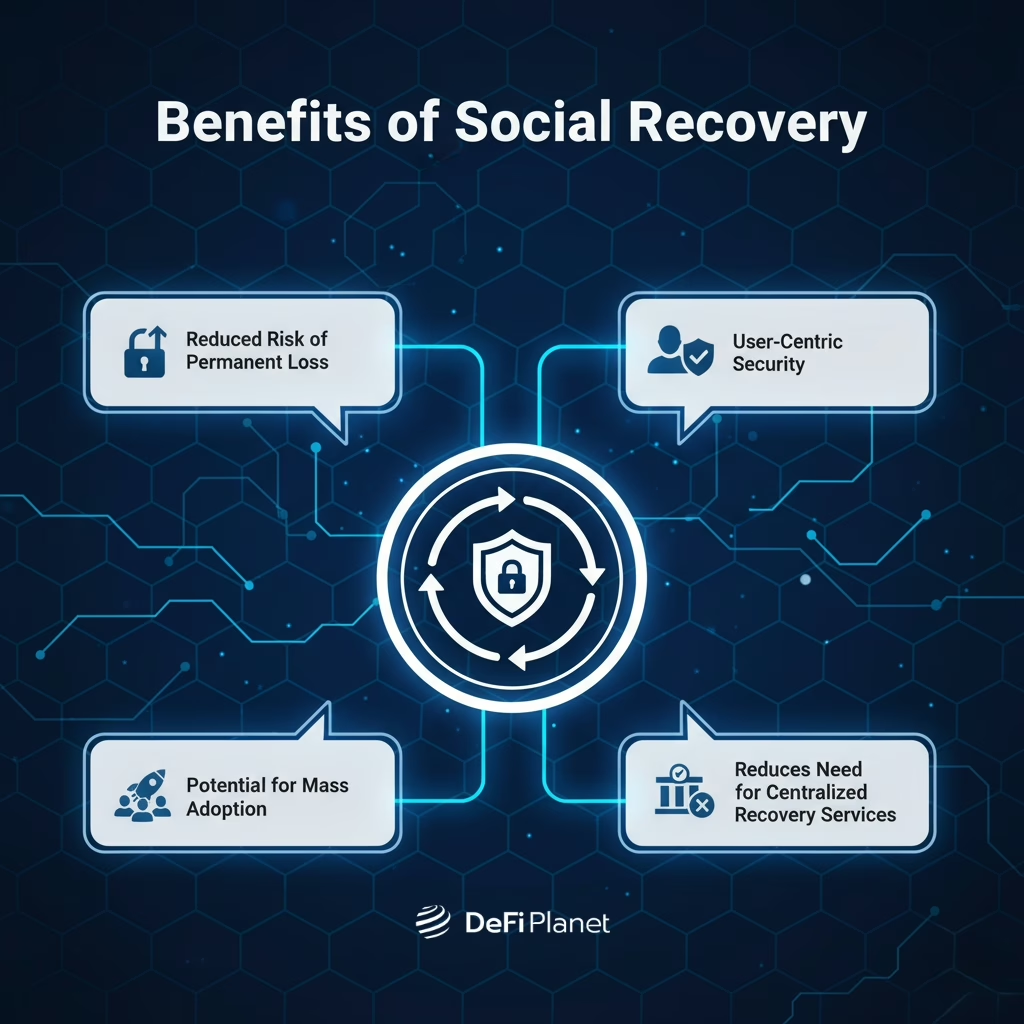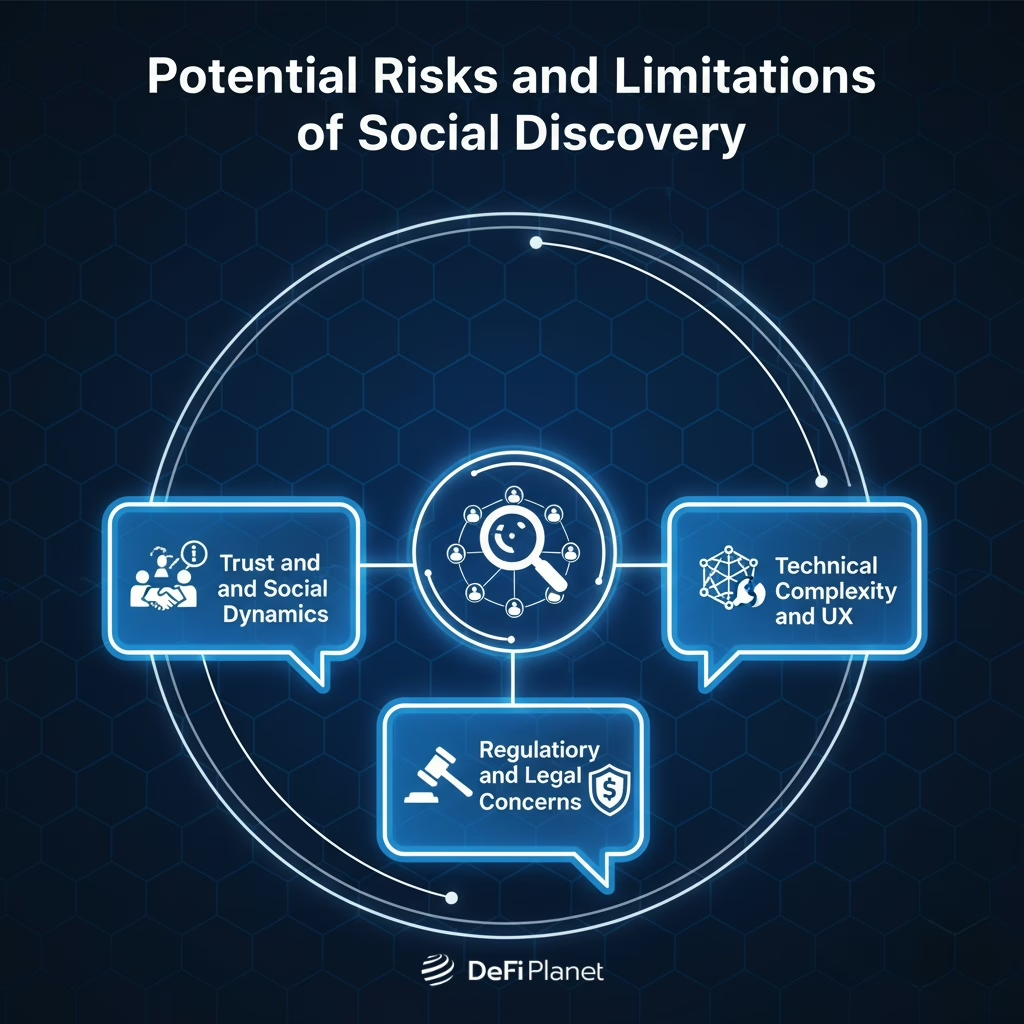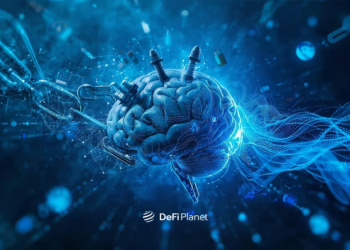For many people in crypto, the idea of losing a seed phrase is terrifying. That 12- or 24-word phrase is the master key to everything in your wallet, and once it’s gone, so is your access to your funds.
Over the years, countless stories have surfaced: early Bitcoin users with millions locked away, NFT collectors unable to retrieve their assets, and even developers permanently locked out of their DeFi platforms. There’s no customer support line to call, and no password reset button. Once a seed phrase is lost, recovery is nearly impossible.
That’s why the crypto community has been searching for a better way, a solution that keeps self-custody intact while reducing the risk of permanent loss. One promising idea is social recovery. But can it really fix the lost-seed-phrase problem without opening new risks?
What Is Social Recovery?
Social recovery is a method of regaining access to a crypto wallet without relying solely on a seed phrase. Instead, it uses a group of trusted people or entities, called “guardians,” to aid your wallet recovery if you ever lose access.
The idea was popularized by Ethereum co-founder Vitalik Buterin, who saw the need for a safer and more user-friendly alternative to traditional seed phrases. It’s especially relevant in a world where self-custody is encouraged, but many users struggle to manage their keys securely.
Unlike the traditional model, where losing your seed phrase means losing everything, social recovery offers a backup plan that doesn’t compromise decentralization. It still puts the user in charge, but adds a layer of human support that feels more practical and forgiving.
How Social Recovery Wallets Work
Social recovery wallets aim to reduce the risks of lost access without sacrificing user control. They rely on guardians, trusted parties who can help with wallet recovery in case you lose your private key or device.
Setup: Choosing Your Guardians
When creating a social recovery wallet, you assign a group of trusted individuals or entities known as guardians. These can be:
- People (friends, family members)
- Devices (like a second phone or hardware wallet)
- Institutions (such as a wallet provider or even a DAO)
Guardians don’t have access to your wallet or funds. They simply have the power to approve a recovery if you lose access. You choose how many guardians you want to help recover a crypto wallet and can update them later if needed.
Recovery: Regaining Access Through Collaboration
If you don’t know what to do after losing your wallet, you can initiate a recovery request. Your guardians are then notified and asked to verify the request.
Once a sufficient number of guardians approve the recovery (based on a predefined threshold), access to the wallet is restored to a new key or device controlled by you.
Threshold Mechanisms: Majority Rule
Social recovery typically uses a threshold system, meaning you don’t need every guardian to approve, just a set number. A common configuration is “3 out of 5”, where three approvals are enough to recover the wallet.
This helps ensure both security and redundancy: even if one or two guardians are unavailable, recovery is still possible.
Several Ethereum-based wallets and standards have adopted or supported social recovery features:
- ERC-4337 (Account Abstraction): Introduces smart contract wallets that support built-in social recovery without requiring seed phrases. It lets users define custom recovery logic, including guardian approvals.
- Safe (formerly Gnosis Safe): A popular multisig wallet that can be configured for social recovery setups, especially useful for DAOs or shared accounts.
- Argent Wallet: One of the earliest consumer wallets to offer social recovery by allowing users to assign guardians during wallet creation, making it both simple and secure for non-technical users.
Benefits of Social Recovery
Social recovery introduces a more intuitive and resilient way to manage crypto wallets, helping users avoid catastrophic loss while staying in control.

Reduced Risk of Permanent Loss
One of the most powerful advantages of social recovery is that it eliminates the need to memorize or physically store a seed phrase. In traditional crypto wallets, losing the seed phrase often means permanent loss of access to funds. Social recovery changes that by allowing users to designate trusted “guardians” who can help restore access.
Even in cases of device theft or accidental deletion of wallet data, users can regain access by coordinating with a predefined number of guardians, making the experience less stressful and more forgiving.
User-Centric Security
Social recovery gives users the freedom to decide who they trust. Guardians can be close friends, family members, other personal devices, or even institutions. This flexibility allows users to tailor their security model based on personal preferences and relationships.
For users who are not technically inclined, this model feels more approachable and human. Instead of managing cryptographic backups, they simply rely on familiar people or services, helping to bridge the usability gap that deters many newcomers from trying self-custody solutions.
Potential for Mass Adoption
One of the main barriers to mainstream adoption of crypto wallets is the complexity of private key management. Social recovery offers a more familiar path by mimicking Web2-style recovery flows like “Forgot Password?”. This lowers the learning curve for new users and makes the self-custody experience less intimidating.
As people around the world become more interested in owning digital assets, social recovery could play a pivotal role in helping onboard billions of users by offering a safer and more accessible alternative to traditional wallet setups.
Reduces Need for Centralized Recovery Services
With social recovery, users no longer need to rely on centralized platforms or customer support to regain access to their wallets. This approach preserves the core ethos of decentralization by keeping recovery in the hands of individuals and their trusted networks.
This removes the single point of failure associated with centralized recovery systems and provides a secure path forward for users who want both convenience and control over their digital assets.
Potential Risks and Limitations
While social recovery offers an alternative to traditional seed phrase storage, it also comes with its own set of vulnerabilities and trade-offs that must be carefully considered.

Trust and Social Dynamics
Social recovery depends on trusting a network of guardians to help recover wallet access. However, this introduces social and human-related risks.
For example, what happens if guardians go rogue, refuse to cooperate, or even collude to take over an account? There’s also the issue of changing relationships, friends may become distant, family ties can weaken, and communication may break down over time.
These dynamics can complicate the recovery process or even create new security vulnerabilities, especially if guardians are not chosen wisely or if the threshold mechanism is too lenient.
Technical Complexity and UX
Despite its user-friendly intent, the current implementation of social recovery still involves technical hurdles. Wallets that support social recovery, especially those using account abstraction or smart contracts, require users to understand new crypto UX concepts like permission settings, threshold approvals, and role delegation.
While projects like ERC-4337 aim to streamline the user experience, the ecosystem is still maturing. For now, onboarding non-technical users to these tools without overwhelming them remains a major crypto UX challenge.
Regulatory and Legal Concerns
Introducing third-party guardians, especially institutions or services based in other countries, raises important legal and regulatory questions. If a guardian mishandles recovery data or is involved in a dispute, determining who is liable becomes complicated.
Furthermore, in cases where guardians are corporations or custodial services, cross-border jurisdictional issues may arise. Different legal systems may interpret data custody, privacy, and fiduciary responsibilities differently, which could hinder the recovery process or even result in legal consequences for guardians and wallet owners alike.
What’s Next for Social Recovery?
Future social recovery models are likely to incorporate biometric verification, like facial recognition or fingerprint scans, and secure enclave features found in modern smartphones.
This integration could simplify wallet recovery by tying access not just to trusted individuals but also to trusted personal devices. Biometric confirmation could act as an added layer of authentication, reducing the need to involve guardians for minor actions or adding a fallback when social recovery is delayed.
By blending physical identity with digital control, the user experience could become more seamless and secure.
Potential for Decentralized Guardian Networks
Rather than relying solely on friends or family, future implementations may allow users to choose from decentralized networks of professional guardians.
These could be smart contracts, DAOs, or staking-based services that hold no control individually but work together transparently to verify and execute recovery requests.
This model would reduce the risks tied to personal relationships and introduce more neutrality and accountability into the process.
Role in Mainstreaming Self-Custody in Web3
Social recovery could play a pivotal role in onboarding the next billion users into self-custody by making crypto wallets feel as forgiving and user-friendly as Web2 apps.
As the tech becomes easier to use and more widely adopted, it may eliminate one of the biggest barriers to entry in Web3, fear of losing everything due to a forgotten seed phrase.
This could help social recovery bridge the gap between decentralized ideals and everyday usability, pushing the industry closer to true mass adoption.
Conclusion: Solving Crypto’s Biggest UX Problem?
Social recovery isn’t a perfect solution, but it marks a major shift in how the crypto world approaches user safety and accessibility. By offering a way to recover crypto wallet access without depending solely on a fragile seed phrase, it reduces one of the most paralyzing fears in self-custody, permanent loss of funds due to human error.
Still, this approach must strike a careful balance. Relying on trusted parties introduces new social and technical risks, and standards around user experience, security, and interoperability are still developing. As with any innovation, the key lies in improving crypto UX, usability without compromising decentralization, the very foundation of Web3.
Ultimately, social recovery opens the door to a more forgiving and inclusive crypto experience. Whether you’re a developer building tools or a user exploring self-custody, now is the time to rethink how wallet security can evolve. With continued experimentation and education, safer and more intuitive recovery systems can become the new norm.
Disclaimer: This article is intended solely for informational purposes and should not be considered trading or investment advice. Nothing herein should be construed as financial, legal, or tax advice. Trading or investing in cryptocurrencies carries a considerable risk of financial loss. Always conduct due diligence.
If you would like to read more articles like this, visit DeFi Planet and follow us on Twitter, LinkedIn, Facebook, Instagram, and CoinMarketCap Community.




















